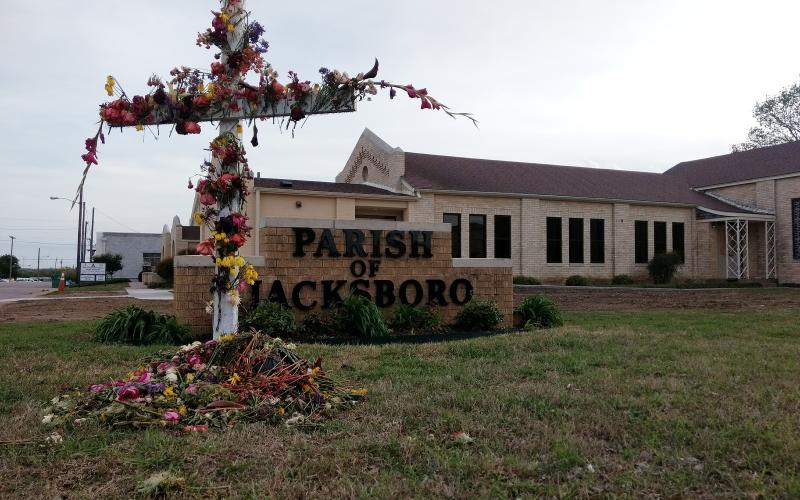Churches formally reunite to move into the future
After 215 years of separation, a new purpose and unity is leading three protestant denominations to reunite. Like churches across the nation from Hawaii to Illinois, the Jacksboro Parish, formed by the separate local congregations of the Presbyterian and Memorial Christian Church, formally became one church body on January 1 of this year.
Last summer, the two churches combined their resources to expand the present Memorial Christian Church building. Construction is nearing completion and the community-friendly building will be dedicated April 15.
Parish pastor Reverend Doctor Suzanne Castle admitted that when she accepted the call to the Parish, she never expected to face the challenge that the building project has been, but she has loved every minute of it.
“Many people believe that mainline churches are dying,” she said. “Maybe they are, but what I do know is we have a call to lose our lives to find them, as the scripture says, and that is what we are doing. We are positioning ourselves to be a place for mission.”
The expanded building contains a large kitchen and plenty of room for the youth programs that are important to the congregation.
“Through backpacks for kiddos that are food insecure to get them through the weekend, to offer a safe place for youth to come and do homework, get help, take showers and find joy, and to continue the way we help with the food bank, all to meet the needs of Jack County.”
For more than 135 years, the Jacksboro Presbyterian and Memorial Christian congregations helped one another when buildings collapsed, when money ran short, when there were wars and hard financial times. In 1973, as membership dropped, the two churches formed The Parish but continued to alternate between Christian and Presbyterian services, to keep their finances separate and to meet alternate Sundays in each church’s building.
Considering the history of the two denominations, it has not been hard to unite the two services into one. In 1803 in the far south-west corner of Pennsylvania, a small group of Presbyterian ministers met to discuss disputes over church doctrine. That meeting led the break-away Presbyterians to form the Disciples Church of Christ.
Independence from England followed by the Louisiana Purchase brought a flood of settlers to the new frontier. The settlers’ hunger for church services led to a religious revival that drew literally thousands of people to wilderness camp grounds
As a denomination, the Disciples Church of Christ flourished and quickly spread through camp meetings south into Mississippi and westward to Arkansas and into the Mexican territory of Texas. The fact that Mexico forbid Protestant churches did not stop the movement.
By the time Texas entered the Union in 1846, the sect was firmly establish throughout North Texas. But trouble was brewing. In the mid-1800’s, small, cheap portable organs and pianos flooded the frontier. All across the west churches split over use of musical instruments becoming the Churches of Christ and the Christian Churches (Disciples).
In Jacksboro, in November of 1881, the Disciples Church of Christ organized and built a small rough-lumber church. When some in the congregation purchased a small pump organ, a quarrel broke out over “that ungodly noise.” They compromised by agreeing to have two services, one Sunday morning without the organ and a second service Sunday afternoon with the organ.
But Sunday afternoon on November 25, 1897, the pro-organ group found a padlock on the rustic church door. That same day, that small group organized as the First Christian Church. The name was changed to Memorial Christian Church in 1938. The Jacksboro Presbyterian Church had organized September 24, 1876.
Nick Koonz, a Brite Divinity School seminarian, is the youth director for The Parish and the First United Methodist Church.
“We take seriously the needs of our young people. Our new building is equipped to be a place for fun and growth, while also knowing that some in our community have difficulties that calls for us to respond as Christians. We have games, wifi, sports, a shower, laundry and much more for all youth.”
The young people who call The Parish home have barely sensed there were two separate churches. Hallie Hackley, 15, whose ancestors founded the Memorial Christian Church, said about The Parish. “For, me The Parish is a home and a community. No matter how I feel or what I’m going through, I can’t help but smile when I walk through those doors.”
“The unity of the Presbyterian and Disciples of Christ denominations means more to me than just the joining of two churches,” said Hallie’s 18-year-old brother Hunter Hackley. “It proves the Christian love of the people who call The Parish their place of worship by displaying the way we can come together and accept each others differences and worship the God we all love.”
Since the mid-1880’s , ancestors of the Davenport family have been members of the Jacksboro Presbyterian Church. Landon Davenport, 15, said, “Through the years that I have been a part of this church, I have known that there were two separate denominations, but they had operated together. Now they have officially come together and I cannot wait to see the spectacular things they will achieve.”
Landon’s younger brother Jett, 13, said, “When I hear The Parish, the first thing I think of is the two denominations that joined together and how we have worked with each other over the years.”
Church attendance is dropping across the country, but Rev. Castle noted that average attendance at the Parish has doubled in two years. “We are a church on the move and we are known as a place for significant community outreach.”
Many other groups of Presbyterian and Christian Churches across the country are taking similar steps such in Kailua, Hawaii; Lexington, Missouri; Jackson, Ohio. Others include Church of Christ and/or Methodist congregations. Several other North Texas churches are presently considering unification.
- Log in to post comments



